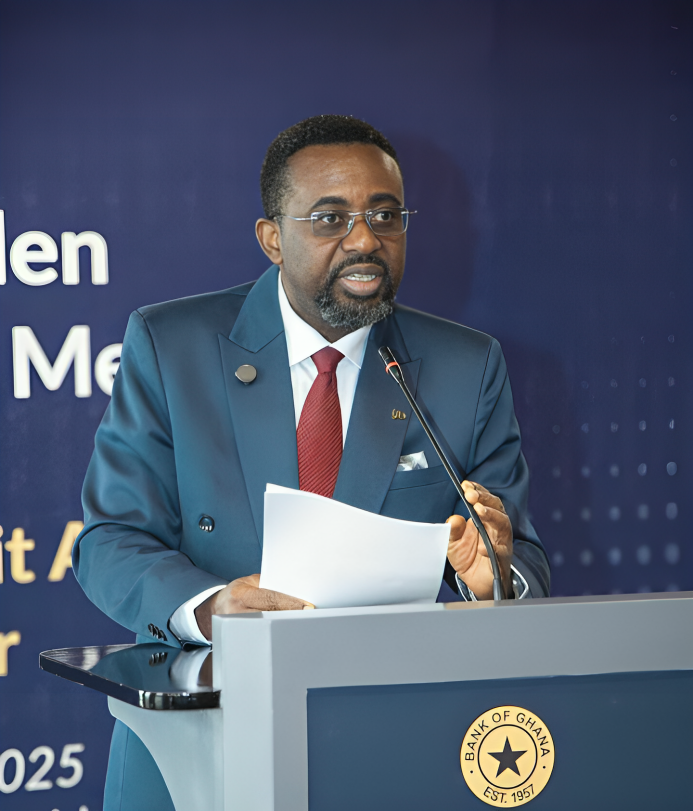- despite MPR hike
- rallies support for inclusive growth, sector reforms
By Ebenezer Chike Adjei NJOKU
The Bank of Ghana (BoG) Governor, Dr. Johnson P. Asiama, has urged banks to moderate the pace of interest rate adjustments and sustain credit flow to viable enterprises – especially those in vulnerable sectors – despite a tightening monetary environment.
He highlighted the importance of transparent communication with clients and the need for innovative lending solutions that protect credit access without undermining asset quality.
This appeal formed the central message of Dr. Asiama’s address to of commercial banks’ chief executives during the BoG’s first post-Monetary Policy Committee (MPC) meeting under his leadership.
The session followed MPC’s decision to increase the policy rate by 100 basis points to 28 percent, aimed at accelerating a disinflation process that remains sluggish.
While acknowledging that the policy rate hike could heighten borrowing costs and constraint business activity, Dr. Asiama stressed the importance of striking a balance between prudence and support.
“The financial system is robust enough to withstand this adjustment,” he stated, calling on banks to avoid an automatic pass-through of rate hikes and maintain credit support to sectors essential to economic recovery.

Already, banks have demonstrated a softer stance toward lending with the Ghana Reference Rate for April 2025 at 23.99 percent.
Also, in February 2025 private sector credit recorded an annual growth of 26.9 percent, a significant rebound from 5.1 percent in February 2024. In real terms, credit growth stood at 3.1 percent compared to a contraction of 14.7 percent over the same period last year.
The Governor’s remarks were delivered against a backdrop of ongoing reforms in the financial sector, which continues to recover from two major disruptions – the banking sector clean-up and Domestic Debt Exchange Programme (DDEP).
While commending banks for their resilience and professionalism through these challenges, Dr. Asiama admitted that aspects of both interventions could have benefitted from better foresight and consultation.
“We cannot change the past, but we can learn from it,” he noted, urging a new chapter of collaboration between banks and regulators to rebuild public confidence and drive inclusive economic growth.
This comes amid signs of recovery highlighted by the most recent data from BoG. As of end-February 2025, total banking assets had grown by 34.05 percent year-on-year while deposits increased by 27.89 percent. Additionally, the Capital Adequacy Ratio (CAR) stood at 14.35 percent – well above the 10 percent regulatory minimum.
Yet risks linger – especially as Solvency challenges persist in some domestically controlled and state-owned banks, where recapitalisation efforts remain incomplete.
BoG is engaging these institutions to address capital shortfalls, ensure compliance with prudential standards and restore depositor trust, the Governor noted.
Additionally, non-performing loans (NPLs) remain elevated with the gross NPL ratio at 22.57 percent – largely due to legacy exposures. Even after adjusting for fully provisioned loans the NPL ratio remains at 8.93 percent, prompting a call for stronger credit risk management and underwriting standards.
Dr. Asiama also encouraged traditional banks to respond with greater innovation and agility, while reaffirming the BoG’s commitment to creating a level playing field that balances innovation with consumer protection.
“Digital transformation must be pursued with discipline,” he warned, noting that operational and cyber risks have intensified. A recent BoG report revealed a 5 percent increase in fraud incidents and 13 percent rise in value at risk, reinforcing the need for banks to strengthen internal controls and cyber resilience.
Dr. Asiama further stressed full compliance with anti-money laundering (AML) and counter-terrorist financing standards. He warned that failure could attract reputational damage and limit Ghana’s access to global financial markets.
To keep pace with emerging challenges, BoG is enhancing its supervisory capabilities. A new Resolvability Assessment Framework is in development to improve crisis preparedness. Meanwhile, supervisors are being trained in areas such as artificial intelligence, climate risk and geopolitical instability.
The Governor emphasised a shift from reactive enforcement to forward-looking supervision, with priorities including risk-based analytics, sustainability assessments and enhanced governance. He hinted at mandatory Basel III and IV training for bank board members to strengthen leadership and regulatory compliance.
Beyond domestic priorities, Dr. Asiama urged banks to deepen their support for trade finance and regional integration – particularly through platforms like the Pan-African Payment and Settlement System (PAPSS). These efforts, he said, could improve transaction efficiency and boost Ghana’s export competitiveness within the African Continental Free Trade Area (AfCFTA).
“Sustainable banking requires strong governance at the core,” he stated, describing ethical and inclusive banking as essential to Ghana’s long-term economic trajectory.
Dr. Asiama reaffirmed BoG’s commitment to its six policy priorities – including exchange rate stability, inflation control, financial inclusion and crisis preparedness – and called on banks to partner with the central bank in delivering a resilient, inclusive and future-ready financial system.
“Financial institutions like yours are essential to Ghana’s economic growth,” he said.
“Together, we must rebuild confidence and position the sector to support inclusive growth,” he added.










